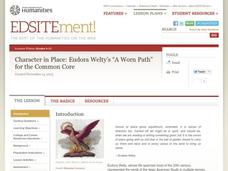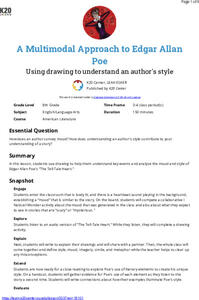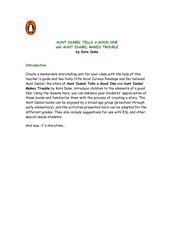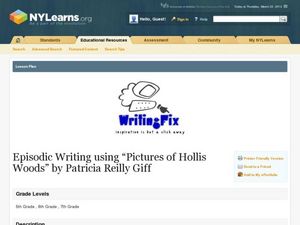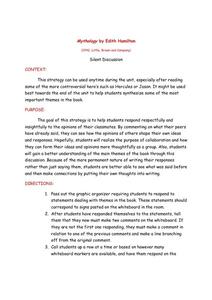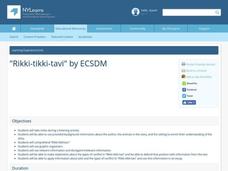Curated OER
Pioneer Values in Willa Cather's My Antonia
Included in this resource are a variety of activities to do while reading Willa Cather's My Antonia. The activities, which range from mapping out Nebraska to writing activities about pioneer living, are all designed with one guiding...
National Endowment for the Arts
Teacher's Guide: The Great Gatsby by F. Scott Fitzgerald
A 10-lesson unit takes high schoolers through a novel study of F. Scott Fitzgerald's The Great Gatsby. To start, students learn about Fitzgerald's background and gain historical context that prepares them for a reading of the book. The...
University of North Carolina
Literature (Fiction)
An informative installment of the Writing for Specific Fields series helps readers learn how to interpret and write about fiction. The website details nine easy steps for writing a literary analysis—a useful method for all readers!
Curated OER
Primary Sources and Protagonists: A Native American Literature Unit
Introduce your middle schoolers to the lives of past Native Americans. First, learners work together to put photographs in a sequence. Then, using their sequence, they create stories to share with the whole class. No matter how old your...
Curated OER
Express Yourself Lesson Seed 12: Story Event
Focus on plot and the impact-specific events in The Cay. Class members use their double-entry journals, created in a previous lesson in this series, to record their thinking about the guiding question as they read chapters 15 through 17....
Vanier College
Analyzing Short Stories/Novels
Good questions can help focus readers' attention on the elements writers use to add depth to their stories. The questions on this worksheet do just that and encourage readers to think critically about a story and author's purpose.
EngageNY
Connecting Literary and Informational Texts: Cronus and “The Key Elements of Mythology”
Is there a connection? Scholars work to make connections between Myth of Cronus and The Key Elements of Mythology. First, they circle important words in the text and look for similarities. They then revisit the concept of theme and...
National Endowment for the Humanities
Character in Place: Eudora Welty’s “A Worn Path” for the Common Core
How do writers use the interaction between elements like characterization and setting to create meaning? Readers of "A Worn Path" create a series of comic book-style graphics of Eudora Welty's short story and reflect on how Welty uses...
Leading Learner
Using Music to Tell a Story or Describe a Scene
Young composers demonstrate their understanding of the stylistic features of descriptive music, including pitch, tempo, dynamics, rhythm, and timbre, by developing a melody and countermelody for a main character in a story. As part of...
K20 LEARN
A Multimodal Approach To Edgar Allan Poe Using Drawing To Understand An Author's Style
True! Poe's "The Tell-Tale Heart" makes readers nervous. But how? Young scholars create a drawing while listening to a reading of Poe's eerie tale to understand how writers create the mood of their stories and what their writing style...
Curated OER
Story Mapping
Fill-out a story map to help your scholars with pre-writing. They will use a story map template to pre-write. They also organize their ideas into steps which become the foundation for their first draft. Concrete objects are brought in to...
Curated OER
Parts of the Plot: Constructing A Plot Diagram
After reading "The King of Mazy May" by Jack London, learners reinforce their literary analysis skills in this SMART board activity. The provided SMART board file allows themto define elements of a short story, and then add it to the...
E Reading Worksheets
Poetic Devices Finder
Track the poetic elements in any text with a guided reading worksheet. Kids note examples of consonance, alliteration, onomatopoeia, repetition, rhyme, and rhythm when reading a poem or story, and provide a short explanation as to why...
EngageNY
Planning for Writing: Revisiting “Key Elements of Mythology” and Determining a Theme in the Myth of Cronus
Refresh my memory please. Scholars quickly read over the Myth of Cronus to refresh their memories of the story. They then get in groups and write parts of the myth on sticky notes that relate to the elements of mythology, sticking their...
Curated OER
My Favorite Story
Students discuss their favorite book. In this book discussion lesson plan, students name the title and tell what makes the book special. Students also review the setting, plot, conflict, and resolution. Students make a book that tells...
Curated OER
Aunt Isabel Tells a Good One...
Explore language arts by reading two similar stories in order to compare and contrast them in class. Young readers read two Aunt Isabel books, by Kate Duke, and discuss the main characters, plot, and setting. They complete a graphic...
Novelinks
Tuck Everlasting: Similes, Metaphors, and Personification in Imagery
Poetic language is abundant in Natalie Babbitt's beautiful novel, Tuck Everlasting. Learners note the examples of similes, metaphors, and personification they find as they read, and illustrate how the language creates a sensory...
Curated OER
Daughters Come of Age in Women's Fiction
Introduce your young readers to fiction written by women authors. For each story, they explore the way these daughters discover and claim their own identities. Individually, class members use the literature to examine their role in their...
Curated OER
Episodic Writing Using Pictures of Hollis Woods by Patricia Reilly Giff
Help your middle-schoolers expand their writing skills with this activity on episodic writing, which focuses on story details, idea development, and organization. After reading "The Eighth Picture: End of Summer" from Patricia Reilly...
Curated OER
Mythology by Edith Hamilton: Silent Discussion
Get everyone up and participating! High schoolers reading Mythology, by Edith Hamilton, complete a graphic organizer independently, and then record one of their thoughts on the white board for a silent discussion. Decide how you're going...
Brigham Young University
Understanding Design, Composition, and Color
The set for a play combines design elements (style, line, shape, mass, measure, position, color, and texture) and principles of composition (unity, harmony, contrast, variation, balance, proportion, and emphasis) to create a particular...
Curated OER
"Rikki-tikki-tavi"
“Rikki-tikki-tavi” provides an opportunity to model for readers how to use background information to enrich understanding of a story. Class members observe animal behavior, listen to biographical background on Rudyard Kipling, study...
Novelinks
The Adventures of Tom Sawyer: Concept Analysis
Ready yourself for The Adventures of Tom Sawyer with this analysis of the novel. Included here is a summary of the plot, a list of themes, notes on vocabulary and other issues, a brief analysis of plot elements, and project ideas that...
Novelinks
The Giver: Concept Analysis
Cover the vocabulary and thematic concepts from Lois Lowry's The Giver with an extended reference guide. It includes relevant plot elements, discussions on themes and motifs, and any possible issues arising from your class's background...
Other popular searches
- Literary Elements of Fiction
- Literary Elements of Poetry
- Literary Elements Worksheets
- Literary Elements Review
- Literary Elements Tone
- Flip Chart Literary Elements
- Antigone Literary Elements
- Literary Elements Character
- Book Report Literary Elements
- Literary Elements of Fantasy
- Elements of Drama Theme
- Teaching Literary Elements









